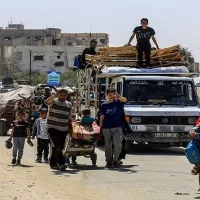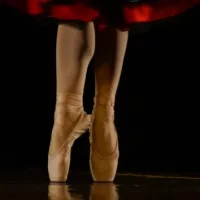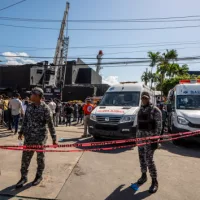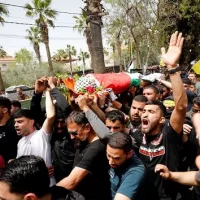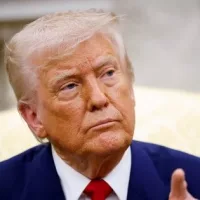LONDON — Maj. Oleh Shyriaiev’s first experience of North Koreans came at the contact line near Kruglenkoe — a village around 8 miles from the Ukrainian border in Kursk, the western Russian region that has become a focal point of the war and an example of both Ukraine’s determination and the brutal war of attrition the two sides are locked in.
Ukraine launched a counteroffensive into the border region in August. Since then, both sides have claimed to have inflicted significant losses on the other. Russia began sending North Korean troops to the region to help fight back against Kyiv’s forces in late 2024, according to Ukrainian, South Korean and Western officials.
“They tried to do an assault with a company group,” Shyriaiev — the commander of the 225th Separate Assault Regiment — told ABC News, speaking by video call from his unit’s operations room close to the front. “We were prepared.”
“We withdrew a bit and we created a minefield,” he recalled. “And after the North Koreans hit those mines, my guys just finished them off with guns.”
The subsequent months saw Pyongyang’s units become the “elite” assault force within Russia’s effort to dislodge Ukrainian troops in Kursk, Shyriaiev said — fighters committed to a mission far from home in horrific battlefield conditions.
Ousting Ukraine’s forces from Kursk became a priority for the Kremlin. But for nearly 8 months, Russian troops struggled, suffering heavy losses for little ground. To drive the Ukrainians out, Russia turned to North Korea for help.
“They do not surrender,” Shyriaiev said of Pyongyang’s troops. “I don’t remember any cases where we have been able to take them captive. We have taken some who were already wounded, but I think they died from their wounds.”
Now, with Ukraine holding onto a sliver of land in Kursk and peace efforts grinding along, Shyriaiev echoed Kyiv’s assertion that the operation was a success, though it ended in Ukrainian retreat.
“They have lost a lot of personnel, both recoverable and irrecoverable losses,” he said of Russian and North Korean forces. “They have lost a lot of equipment, a lot of their infrastructure has been damaged, which means that they would need to rebuild it. This also comes at a cost. And this also weakens Russia.”
For Moscow, the eventual ejection of Ukrainian forces from almost all of Kursk was a signal of Russian resolve. President Vladimir Putin’s visit to the Kursk front in March visibly tied him to the operation. “Your task is to completely destroy the enemy,” Putin said, while clad in military fatigues. “The previous status along the borderline must be restored.”
North Korea’s assistance came at a sensitive moment. President Joe Biden was soon to leave the White House, with his successor President Donald Trump returning to the Oval Office promising to quickly end Russia’s war. Trump had repeatedly hinted that a future peace deal would include Ukrainian territorial and political concessions and be twinned with the curtailment of U.S. aid to Kyiv.
Trump has been broadly critical of Ukraine’s conduct since returning to office, repeatedly framing Kyiv as the main impediment to a peace deal. In March, Trump claimed that “thousands of Ukrainian troops” were “completely surrounded” in Kursk, describing their position as “very bad and vulnerable.” Ukrainian leaders rejected the characterization as false.
First contact
Shyriaiev was already a decorated veteran of Ukraine’s fiercest recent battles when his unit crossed into Russia in the vanguard of the surprise Ukrainian August 2024 offensive into Kursk. One month later, he would be recognized as a “Hero of Ukraine” by President Volodymyr Zelenskyy.
“At the very beginning, I had a skeptical view of this,” Shyriaiev said of the daring Kursk operation, which saw Kyiv’s forces seize nearly 500 square miles of Russian territory, initially stunning Russia’s military and embarrassing Putin.
“I am proud that we were the first to actually bring the fight to Russian soil,” Shyriaiev said of his regiment, which is made up of five battalions with a total strength of some 5,500 soldiers.
The theater became the first to which North Korean troops were deployed — a force of some 10,000 soldiers, according to the U.S. — dispatched by Pyongyang to aid Moscow’s embattled soldiers, marking a new level of North Korean involvement in the Kremlin’s 3-year-old war on its neighbor which began with a full-scale invasion of Ukraine in 2022.
As one of the first Ukrainian units to push into Kursk, the 225th was also among the first to come up against North Korean soldiers. The experience gave Shyriaiev and his troops a rare level of insight into Pyongyang’s forces, he said.
Initially, North Korean soldiers were thrown into so-called “meat assaults,” Shyriaiev said, a term Ukrainian troops use to describe the poorly-supported and costly infantry wave attacks employed by Russian commanders throughout the war.
The North Koreans were guided only by limited training inside Russia and their nation’s experience of World War II- and Korean War-era combat. “This experience didn’t include the use of unmanned aerial vehicles, it didn’t include any kinds of modern tactics,” he said.
That lack of experience was reflected in heavy casualties, though exact estimates vary. British intelligence assessed that by March roughly 5,000 of the 11,000 North Korean troops deployed to fight Ukraine had been killed or wounded, with a third likely killed.
Zelenskyy and Kyrylo Budanov — the head of Ukraine’s military intelligence — both said in February that North Korean troops had suffered about 4,000 casualties.
South Korea’s National Intelligence Service said in March that North Korean forces had suffered around 5,000 casualties, according to the Yonhap news agency, South Korea’s state media.
Shyriaiev’s 225th Regiment soon noticed that the North Koreans had adapted. “They were moving forward not as a company, but in small groups” using reconnaissance, grenade-dropping and first-person view attack drones, Shyriaiev said, recalling later battles to the south of the town of Sudzha.
“They were doing these assaults in small groups so that they would not suffer such large losses at once.”
The 225th’s experience is representative of the broader trajectory of North Korean combat performance in Kursk, Shyriaiev said, with North Koreans quickly becoming the leading element of Russia’s attacks.
“They were always used in assault, and the Russians are then used to secure the ground that the Koreans have taken,” he said.
“They are the best prepared in terms of their physical preparation,” Shyriaiev continued. “They are good marksmen. They are not afraid to engage drones — they are shooting down drones with guns. They do not leave their wounded behind. They always try to evacuate them.”
Where Russian forces are “being sent into battle under duress — as with a horsewhip,” Shyriaiev said, “Koreans are more devoted, and to die heroically on the field of battle is something that Korean soldiers are proud of.”
‘I do not feel pity’
Russia eventually succeeded in largely driving the Ukrainians out of Kursk last month.
Ukrainian troops were forced to hurriedly retreat from Sudzha after Russian and North Korean forces succeeded in breaking through Ukrainian lines, following weeks of increasingly strangling Ukraine’s supply route into the area. Ukraine now still holds a tiny sliver of Kursk, trying to prevent Russia from advancing into the Sumy region.
Ukrainian troops had to adapt to their new North Korean enemies, Shyriaiev said. “It is perfectly possible to fight them if you are prepared,” he said.
“You need to create obstacles for them. You need to create a minefield, and our guys need to be confident enough to go in and finish them after they have stepped on mines or have been hit by any type of artillery rounds which are supplied to us by our American partners.”
South Korean intelligence suggested last year that the families of troops dispatched to Russia had been put in isolation. A former North Korean soldier told ABC News he believes that few of Pyongyang’s forces had been captured while fighting against Ukraine because they are told their families will be executed if they are caught alive.
“If the soldiers are captured and tell information to the enemy, their families will be punished, go to a political prison camp, or worse, they will be executed in front of the people,” said another North Korean defector, Pak Yusung.
Shyriaiev said he was unmoved by any suggestion that the North Korean soldiers sent to Kursk were misled or coerced.
“I do not feel pity towards anyone who is waging war against my country,” he said. “North Koreans are enemies for me and they are the enemies of my country.”
“Also, I do not think that they don’t understand where they have found themselves,” Shyriaiev continued. “It’s impossible that they just don’t know, or are clueless about where they ended up.”
“I do not respect this adversary,” Shyriaiev said. “This is not some kind of a tournament or ceremonial fight between knights. This is a war, a war which is a painful burden for our land, for our families.”
‘Yearning for peace’
Whether waged by Russians or North Koreans, Shyriaiev said he believes the war will drag on despite U.S.-led peace efforts.
“All of us are, of course, yearning for peace,” he said. “But when people begin to talk about loss of territories, this is a very painful, very sensitive issue.”
Ukrainians should consider a ceasefire an opportunity to “prepare for the continuation of a fight, because with this kind of a neighbor, we need to constantly be on guard,” Shyriaiev continued. “We know that Russia is a country that never, never keeps its promises. It is a neighbor that is always a threat that has always aimed to suppress us and to conquer us.”
Moscow has framed its ongoing invasion — plus decades of influence operations and, since 2014, cross-border military action — as a pre-emptive measure to forestall combined Ukrainian-NATO aggression against Russia. The “special military operation,” as the Kremlin termed the invasion, was launched “to defend ourselves from the threats created for us,” Putin said as the attack began.
While Trump’s administration pushes Ukraine to cede land, Shyriaiev suggested that the existential threat posed by Moscow necessitates the recovery of all land within Ukraine’s 1991 internationally-recognized borders — including Crimea and the eastern Donbas region.
“We need to never forget this experience,” he said. “We need to know that at any moment, Russia can attack again. And we need to be prepared.”
Copyright © 2025, ABC Audio. All rights reserved.






